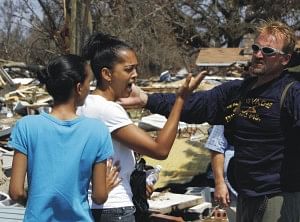Rape, murder, mayhem in New Orleans' shelter
Reuters, Afp, New Orleans
With the rotors of President George W. Bush's helicopter sounding overhead, New Orleans' poor and downtrodden recounted tales of murder, rape, death threats and near starvation since Hurricane Katrina wrecked this city. Death and despair still stalked stranded hurricane survivors after five days of appalling suffering and there was growing uncertainty about the future of the jazz capital. The Army Corps of Engineers said Friday it may need up to 80 days just to drain the floodwaters from the city. "It will be 36 to 80 days to be done with the de-watering," said Brigadier General Robert Crear. Tulane University, a top institution of higher learning in New Orleans, announced meanwhile it has cancelled its fall semester and told its nearly 6,000 undergraduates to enrol elsewhere. "Given the ongoing situation in the city, I am forced to make an extremely difficult decision -- Tulane University cannot hold a fall semester on its campus," university president Scott Cowen said in a statement. US President George W. Bush, who toured storm-ravaged areas of Louisiana, Mississippi and Alabama on Friday amid fierce criticism of the pace of government relief efforts, has vowed to rebuild New Orleans and was to make a live radio address to the nation on Saturday at 10:00 am (1400 GMT). Ending days of abandonment since the hurricane struck on Monday, the US National Guard handed out military rations and a bottle of water to thousands of evacuees -- the first proper meal most had eaten in days. But as the masses lined up outside, herded by Army troops toting machine guns, inside the convention centre where these people slept since Monday was the stench of death and decay. Leroy Fouchea, 42, waited in the sweltering heat for an hour to get his ration -- his first proper food since Monday -- and immediately handed it over to a sickly friend. He then offered to show reporters the dead bodies of a man in a wheelchair, a young man who he said he dragged inside just hours earlier, and the limp forms of two infants, one just four months old, the other six months old. "They died right here, in America, waiting for food," Fouchea said as he walked toward Hall D, where the bodies were put to get them out of the searing heat. He said people were let die and left without food simply because they were poor and that the evacuation effort earlier concentrated on the French Quarter of the city. "Because that's where the money is," he spat. A National Guardsman refused entry. "It doesn't need to be seen, it's a make-shift morgue in there," he told a Reuters photographer. "We're not letting anyone in there anymore. If you want to take pictures of dead bodies, go to Iraq." As rations were finally doled out here on the day President Bush visited the devastated city, an elderly white woman and her husband collapsed from the heat. "I had to walk two blocks to get here and I have arthritis and three ruptured discs in my back," said Selma Valenti, 80, as her husband lay beside her, being revived by a policeman in riot gear. The two had eaten nothing since Wednesday.
|

Bromwynne Bassier (C) cries in the street that her son has no clothes as her sister Kim Bassier (L) and local resident Kevin Miller try to console her in the midst of Hurricane Katrina damage in Biloxi, Mississippi Friday. PHOTO: AFP |